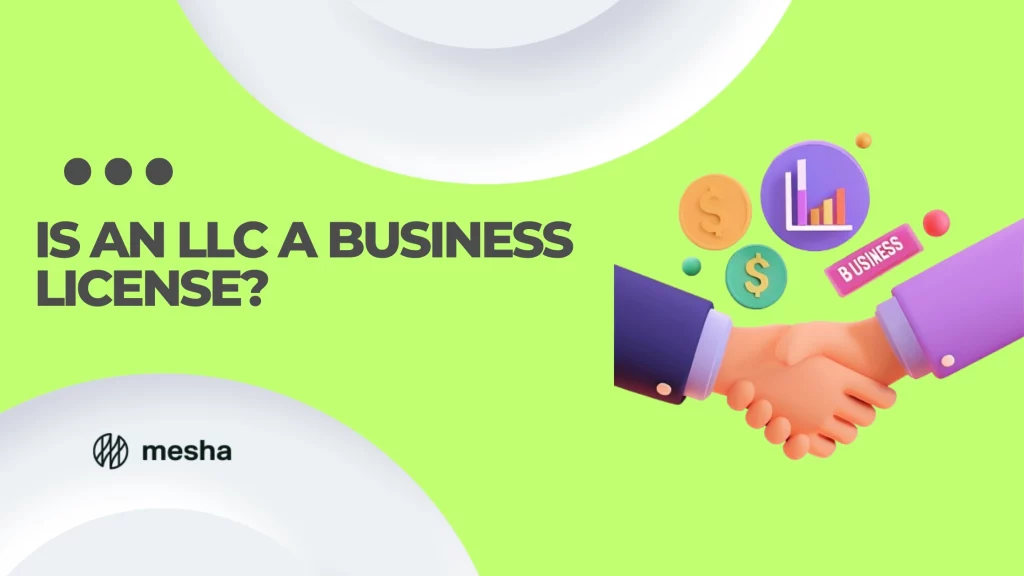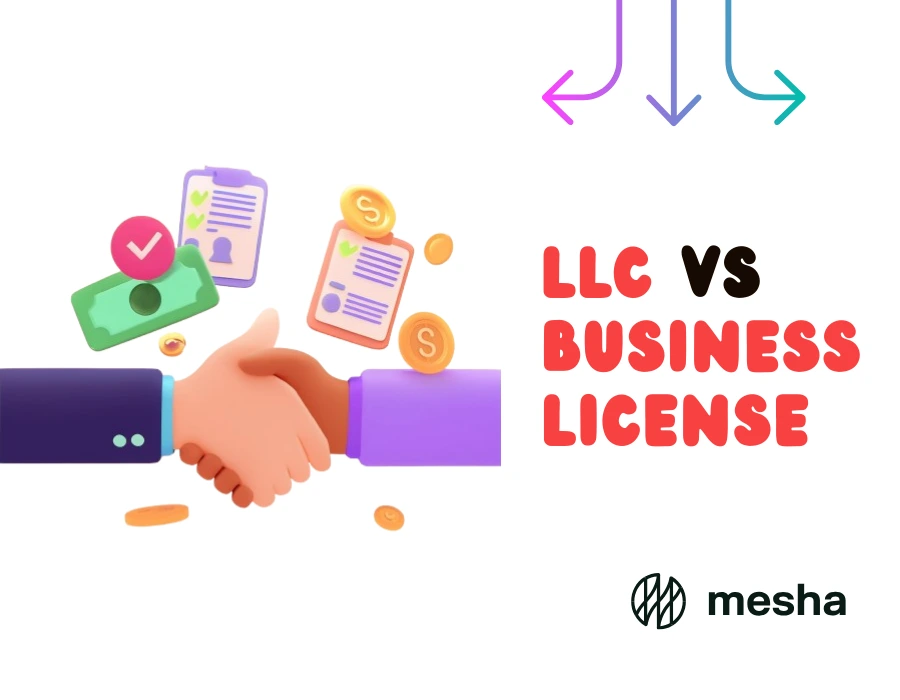Is an LLC a business license? Explained

Starting a business involves many decisions. One of the most crucial is choosing the right business structure.
You may have heard of the LLC business structure. It stands for Limited Liability Company. It’s a popular choice for many entrepreneurs.
But what about a business license? Is an LLC a business license? The short answer is No. They are two different things.
In this article, we will delve into the differences between an LLC and a business license. We’ll explain what each one is, their purpose, and why they are important.
Whether you’re a seasoned entrepreneur or just starting out, this guide will provide valuable insights. It will help you navigate the complexities of business formation and operation.
Understanding the LLC Business Structure
An LLC, or Limited Liability Company, is a type of business structure. It’s a legal entity separate from its owners, known as members.
One of the main benefits of an LLC is the protection it offers. It shields personal assets from business liabilities. This means that if the business incurs debts or is sued, the members’ personal assets are generally safe.
Here are some key characteristics of an LLC:
- Limited liability: Members are not personally liable for business debts or liabilities.
- Flexibility in management: LLCs can be managed by the members or by appointed managers.
- Tax options: An LLC can choose how it wants to be taxed, as a sole proprietorship, partnership, or corporation.
- Credibility: Having LLC in your business name can boost your credibility with customers and suppliers.
Understanding the LLC business structure is crucial for entrepreneurs. It helps you make informed decisions about your business’s legal structure. It also helps you understand the responsibilities and potential benefits that come with forming an LLC.
What is a Business License?
A business license is a permit issued by a government agency. It allows you to legally operate a business in a specific jurisdiction.
The purpose of a business license is to ensure compliance with local laws and regulations. It also helps protect the health and safety of the public.
Different types of businesses may require different licenses or permits. For example, a restaurant may need a health permit, while a construction company may need a building permit.
It’s important to understand that a business license is not the same as a business structure. A business license is a requirement for operation, while a business structure, like an LLC, defines the legal and financial organization of your business.
LLC vs Business License: Key Differences

An LLC and a business license serve different purposes in the business world. An LLC, or Limited Liability Company, is a type of business structure. It provides its owners, known as members, with limited liability protection.
This means that members are not personally responsible for the company’s debts and liabilities. This protection is similar to that of a corporation, but an LLC is simpler to set up and manage.
On the other hand, a business license is a permit that allows a business to operate in a specific area. It’s a legal requirement that applies to most businesses, regardless of their structure. Here are some key differences between an LLC and a business license:
- An LLC is a business structure, while a business license is a permit for operation.
- Forming an LLC provides limited liability protection, while obtaining a business license does not.
- An LLC is formed at the state level, while business licenses are usually issued by local government agencies.
- An LLC has ongoing compliance requirements, such as filing annual reports, while a business license typically needs to be renewed periodically.
Understanding these differences is crucial for business owners. It helps ensure that your business is both legally compliant and protected from potential liabilities.
The Process of Forming an LLC
Forming an LLC involves several steps. First, you need to choose a unique name for your LLC that complies with your state’s naming rules. This name should not be in use by another company in your state.
Next, you file the Articles of Organization with your state’s Secretary of State office. This document includes important information about your business, such as its name, purpose, and the names of the members. There is usually a filing fee associated with this process.
Finally, you create an Operating Agreement. This document outlines the ownership and operating procedures of the LLC. It’s not always required by the state, but it’s highly recommended for all LLCs.
Why Your LLC Needs a Business License
An LLC is a legal business structure, but it’s not a license. To operate legally, most businesses, including LLCs, need a business license. This license is a permit issued by government agencies that allows you to conduct business.
The requirement for a business license is not dependent on your business structure. It’s based on the nature of your business activities. Whether you’re a sole proprietor, a partnership, or an LLC, you’ll likely need a business license.
Obtaining a business license shows that you comply with the laws and regulations of your jurisdiction. It’s a crucial step in establishing your business’s credibility and trustworthiness.
Types of Business Licenses and Permits for Your LLC
The type of business license or permit your LLC needs depends on your business activities. Different industries and professions have specific licensing requirements. For instance, a restaurant may need a health permit, while a construction company may need a building permit.
Here are some common types of business licenses and permits:
- General business license
- Professional and trade licenses
- Health and safety permits
- Environmental permits
- Signage permits
- Building and construction permits
Remember, the requirements can vary by state and locality. Always check with your local and state agencies to ensure you have the necessary licenses and permits.
Consequences of Operating Without a Business License
Operating your LLC without the necessary business licenses can lead to serious consequences. These can range from fines and penalties to the closure of your business.
In some cases, you may also face legal action. This could damage your business reputation and result in loss of customers.
Therefore, it’s crucial to ensure your LLC is properly licensed. This not only keeps your business compliant but also builds trust with customers and suppliers.
Maintaining Compliance: LLC and Business License Renewals
Maintaining compliance is a key aspect of running an LLC. This includes renewing your business license as required by your local and state laws.
Failure to renew your license can lead to penalties. It can also result in the suspension or revocation of your license.
Therefore, it’s important to keep track of your renewal dates. Consider setting reminders or using a compliance service to help manage these tasks.
Conclusion: Ensuring Your LLC is Properly Licensed
In conclusion, an LLC is not a business license, but a legal business structure. It provides limited liability protection and has its own set of compliance requirements.
On the other hand, a business license is a permit issued by government agencies that allows individuals or companies to conduct business within the government’s geographical jurisdiction. It’s crucial for an LLC to obtain the necessary business licenses and permits to operate legally.
Understanding the difference between an LLC and a business license, and ensuring your LLC is properly licensed, is key to running a successful and compliant business.


